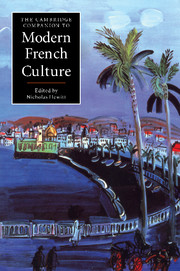Book contents
- Frontmatter
- Introduction: French culture and society in the twentieth century
- 1 Modern France: history, culture and identity, 1900-1945
- 2 Culture and identity in postwar France
- 3 Architecture, planning and design
- 4 The mass media
- 5 Consumer culture: food, drink and fashion
- 6 Language: divisions and debates
- 7 Intellectuals
- 8 Religion, politics and culture in France
- 9 The third term: literature between philosophy and critical theory
- 10 Narrative fiction in French
- 11 Poetry
- 12 Theatre
- 13 Music
- 14 The visual arts
- 15 Cinema
- Index
12 - Theatre
Published online by Cambridge University Press: 28 May 2006
- Frontmatter
- Introduction: French culture and society in the twentieth century
- 1 Modern France: history, culture and identity, 1900-1945
- 2 Culture and identity in postwar France
- 3 Architecture, planning and design
- 4 The mass media
- 5 Consumer culture: food, drink and fashion
- 6 Language: divisions and debates
- 7 Intellectuals
- 8 Religion, politics and culture in France
- 9 The third term: literature between philosophy and critical theory
- 10 Narrative fiction in French
- 11 Poetry
- 12 Theatre
- 13 Music
- 14 The visual arts
- 15 Cinema
- Index
Summary
Introduction
Cultural history has little regard for landmarks suggested by the calendar, and, though the twentieth century was an active and highly distinctive epoch in French theatre, it did not begin neatly in 1900. Traditionally, French theatre performances were heralded by 'les trois coups' (three strokes of a broomstick against the boards behind the curtain). Likewise, twentieth-century theatre was heralded by three late nineteenth-century events: the opening of the experimental 'Théâtre libre' by André Antoine in the Passage de l'Elysée-Montmartre in 1887; the first public projection of moving pictures from a strip of celluloid in the Grand Cafe, Boulevard des Capucines, in 1895; and the opening - possibly just the opening line, 'Merdre!' - of Alfred Jarry's Ubu Roi (King Ubu) in Lugné-Poë's Nouveau Théâtre in the rue Blanche in 1896.
Several features of these events are worthy of note. First, they took place in, or just across the road from a single Paris arrondissement (the 10th) within an 800-metre radius of the corner of the Rue Montmartre and the Boulevard Poissonnière, a circle that also encompassed, at the time, a large proportion of Parisian theatres and private schools of art.
- Type
- Chapter
- Information
- The Cambridge Companion to Modern French Culture , pp. 248 - 271Publisher: Cambridge University PressPrint publication year: 2003

